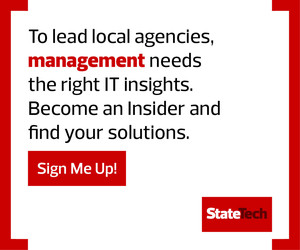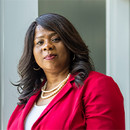STATETECH: Can you characterize your time in office as you mark your first year as CIO? What have been the victories and challenges to date?
Thomas: I have one of the best teams out there. That’s one of the victories. Stepping into some of the challenges, we are always trying to stay one step ahead of threat actors. They’re getting more bold and more sophisticated. We do one thing, and they do two things.
Like everyone else, we’ve been facing supply chain issues. The pandemic has brought more challenges than we could have imagined. Still, most of our vendors are doing a pretty good job at keeping up. Another challenge is supporting agencies in adapting to change. We are encouraging transparency and trying to get everybody to share and to open their environments to us. Making changes to established ways of operating isn’t always easy.
EXPLORE: How the Port of Long Beach is establishing supply chain information.
STATETECH: How are you making government more attractive to younger workers?
Thomas: Attracting younger workers can be tricky, especially for the public sector.
The public sector is not cool in any way. We’re trying to change that by adopting new technology, which can spur a whole new innovative environment. So, with new technology, you’re killing two birds with one stone. Young workers are used to the latest and greatest tools and technology, not old, antiquated tools and desktop boxes. We’re trying to create that new space for them to want to come to work.
State government should always be trying to build a pipeline of new, skilled resources. We need talented workers ready to help agencies serve constituents in a rapidly changing environment.
STATETECH: Some CIOs believe remote work can help to attract a diverse talent pool and perhaps younger workers. Do you have any thoughts on that?
Thomas: That is part of the appeal of a new workspace. We’re in a hybrid model right now, and I do believe that will play an integral part in attracting those younger workers. If they have a nice workspace at the office and a comfortable workspace at home, it gives them more creative control over what they do. I believe that makes a big difference.
We have 12 college students we recently brought on as interns, and they are so excited about state government. We are doing our best to make state government a cool place to build a career.
REVIEW: How state and local government agencies are responding to remote work.
STATETECH: You also have a big focus on customer service. What can state agencies expect from the Georgia Technology Authority?
Thomas: Agencies can expect more support in whatever they need. We’ve established a strike team to go directly into our agencies, talk to them and really explore their issues face to face.
I’ve created my strike team under Chief Development Officer Keith Perry, and the team is working with the agencies, getting that customer feedback and then identifying what might be needed. We can get them new applications, or we can build them if necessary, for example. We do what we can to remove any roadblocks or pain points.
They can also expect us to help them with resources. We’re ramping up our security team to make sure that we have resources to help agencies that really don’t have those skill sets.
DIVE DEEPER: How cloud migration may provide upskilling opportunities.
STATETECH: You made a splash by appointing a chief cloud officer, a unique role in state government. What was the inspiration for that position? How has it been helping Georgia to achieve its tech agenda?
Thomas: That grew from our governor’s initiative to shift state systems to the cloud. Titles mean something, and establishing the role of chief cloud officer sent a direct message to everyone about where we are going. Our cloudfirst strategy inspired that role, and we needed someone with the right skill set and experience. At the top of my agenda was getting the best of the best, and that’s what I got from Dmitry Kagansky, who came from Amazon Web Services to move us to the cloud. He’s conducting assessments at the state data center and getting those applications ready for migration.
Dmitry is also doing a very good job motivating and reskilling the team and identifying the new tools we will need. Having Dmitry here has created a new excitement at the Georgia Technology Authority.












